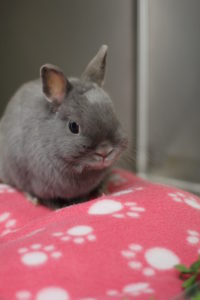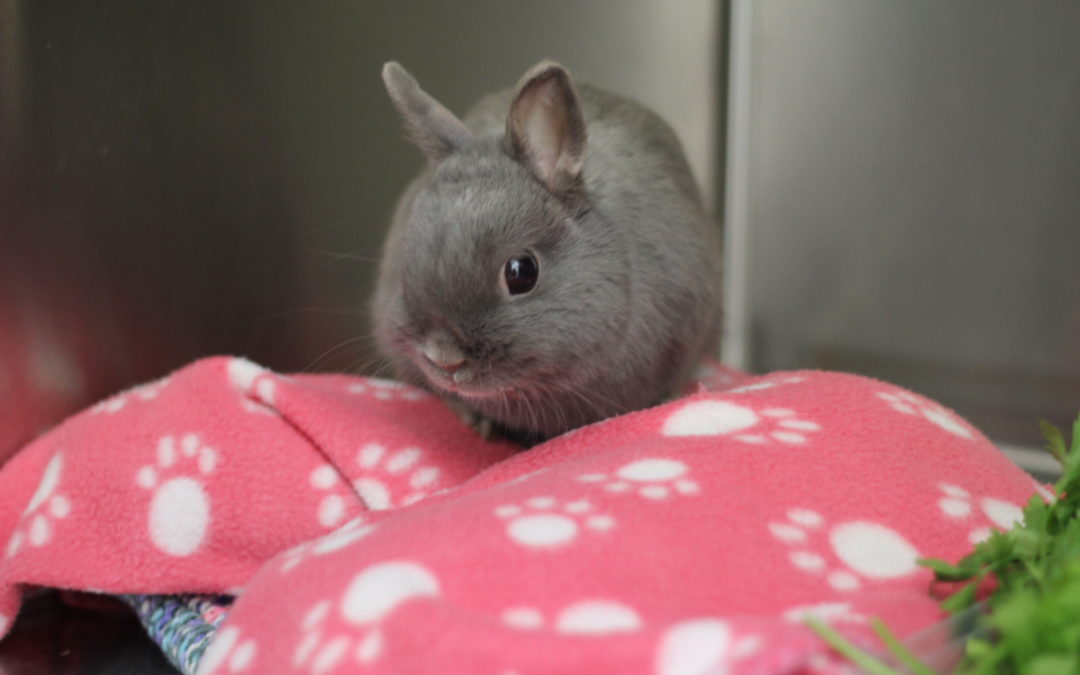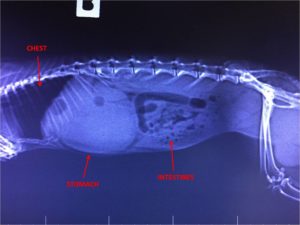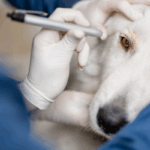Everything you need to know about Gut Stasis in Rabbits
By Dr Hazel Patterson BSc DVM
 You may have heard of the term ‘gut stasis’ before, or had a rabbit with this problem in the past. It is a common and potentially fatal condition affecting rabbits, so as a bunny owner it is important to have a good understanding of this disease. The term ‘gut stasis’ literally means a ‘slowing of the gut’ – that is, the normal contractions and movements of the gut that carry food through the digestive system are bought to a standstill, leading to a very sick and uncomfortable bunny!
You may have heard of the term ‘gut stasis’ before, or had a rabbit with this problem in the past. It is a common and potentially fatal condition affecting rabbits, so as a bunny owner it is important to have a good understanding of this disease. The term ‘gut stasis’ literally means a ‘slowing of the gut’ – that is, the normal contractions and movements of the gut that carry food through the digestive system are bought to a standstill, leading to a very sick and uncomfortable bunny!
What causes gut stasis?
Rabbits have a very unique digestive tract that predisposes them to this condition. They are strict herbivores, and have a very high requirement of fibre for their gut to function properly. Rabbits on a poor diet are most at risk of this condition. Anything that causes your rabbit to stop eating can trigger an episode of gut stasis – this may be a stressful event such as moving house or introducing a new bunny, or disease in other parts of the body such as dental disease, respiratory disease, liver or kidney disease.
How will I know if my rabbit has gut stasis?
Because the gut isn’t moving, rabbits with gut stasis will have a decreased appetite and decreased faecal production. They may gradually go off food over a period of several days to a week, and you may notice that faeces are small and dry or completely absent. Bunnies may seem to be otherwise okay, but many will look generally ‘sick’.
What do I do if I think my rabbit has gut stasis?
If you suspect that your rabbit may be sick, then he or she should be seen by a vet as soon as possible. If left untreated, this condition can lead to shock and even death. The vet will start by doing a thorough physical examination of your bunny. When feeling the bunny’s abdomen the vet may noticed that the contents feel firm or doughy, and when listening with a stethoscopes the normal gurgling gut sounds may be reduced or absent. Often rabbits will be dehydrated, which the vet can detect by checking the rabbit’s gums and checking the elasticity of the skin (‘turgour’).
Further testing such as x-rays of the abdomen may be needed to make a diagnosis or to rule out other conditions.
How will my rabbit be treated?
Every bunny is different, so a treatment plan will be made for your individual rabbit depending on the severity of their disease and their individual circumstances. The basic principles of treatment for all bunnies include:
- Hydration. By giving fluids this will help to rehydrate and soften the stomach contents. If your bunny is severely dehydrated then it may need injections of fluid under its skin, or even to be in hospital on a fluid drip. Usually giving water by mouth or with food is sufficient.
- Nutrition. Providing good quality food will help to get the gut moving again. ‘Critical care’ formulas are available that will allow you to syringe feed a slurry of nutritious, high fibre food whilst the rabbit is unwell and may not want to eat on its own. This is critical for a rapid recovery.
- Pain relief. If the vet feels that your rabbit is in anyway uncomfortable, then they will be provided with pain relief either given as an injection or as medication that you can give at home by mouth.
- Medications. Often injections of medications that increase the contractions of the gut (‘pro-kinetics’) will help rabbits in their recovery together with the above treatments.
If your bunny has any other underlying conditions, then these will need to be treated too. If treated appropriately then most rabbits recover and start to respond to treatment within 3-5 days. The earlier you seek medical treatment, the better the outcome!
How can I prevent this from happening?
The best way to reduce your rabbits risk of gut stasis is to provide a healthy and balance diet. This should consist of:
- Unlimited access to grass and good quality grass hay (e.g. timothy, oaten, pasture, ryegrass) – this should be 75% of the rabbits diet
- 10-20% dark leafy greens and herbs such as bok choy, brussel sprouts, parsley and spinach. A total of around 1 cup of veggies for an average 1.8kg rabbit is a good amount.
- Pellets should only be offered in minimal amounts, and should be of a good quality and high in fibre (we find ‘ox bow’ to be a reliable brand)
- Treats – small pieces of fruit or veggies such as apple or carrot can be given as occasional treats
Since gut stasis can be caused by other conditions, we also recommend rabbits have an annual health check with the vet for a full examination so any health concerns can be picked up before they start to cause a problem.







